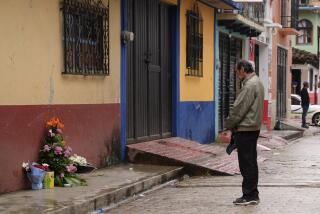Chiapas: A State of Denial
One year after armed men massacred 45 villagers, including 15 children, in the Mexican village of Acteal, Chiapas, Mexico’s attorney general has issued a disappointing report on his findings and has failed to punish those responsible for the killings.
According to the 153-page report, the massacre was the result of a long history of religious and economic conflict between neighboring villages. The presence of Zapatista rebels in the area and a general absence of law there contributed, the report declared. Then, in a mind-boggling assessment of the massacre, the deputy attorney general who presented the report declared that his office “found no political roots” in the killings.
Impossible. Ever since the Zapatista uprising on Jan. 1, 1994, the short-lived rebellion, the armistice, the subsequent municipal reorganization with the government, the army and the Zapatistas controlling separate areas--and the massacres, big and small--all have had political roots.
This report seeks to reinforce the government line that instability among the people of Chiapas is at fault, not any action by the political establishment in Mexico City or its officials in the south. What the report lacks is as troubling as what it contains. Conspicuously absent, for instance, is any mention of the growing number of paramilitary groups in Chiapas. Who are they, who sponsors them and who arms them? Nor does the report deal with accountability. Did Chiapas’ governor, a federal officer, get early word of the Acteal massacre? If so, and he did nothing to stop it, he surely bears some responsibility.
The roots of the problem in Chiapas are deep and complex, and the Zapatista leadership is dogmatic and difficult to deal with, but the government is not doing enough to find a settlement. What happened in Acteal, and why, should be firmly established by the authorities and those responsible for the massacre should be punished. It is a shame that one year later only one of the 135 arrested suspects has been sentenced.
The office of the attorney general cannot, in good conscience, simply conclude that Chiapas is a lawless state and do nothing about it. The matter of the Acteal massacre must be resolved and the guilty punished.
More to Read
Sign up for Essential California
The most important California stories and recommendations in your inbox every morning.
You may occasionally receive promotional content from the Los Angeles Times.










